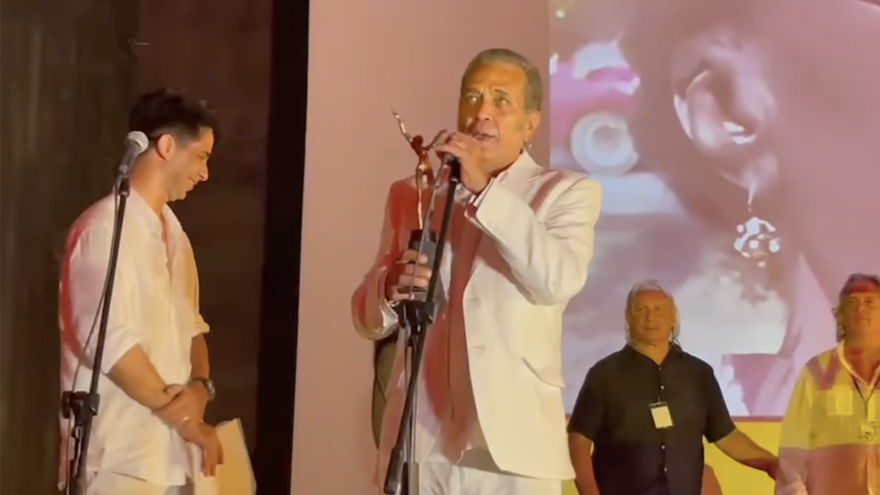
![]() 14ymedio, Havana, August 3, 2023 — During Tuesday’s opening ceremony at the Gibara International Film Festival in Holguín province, Cuban actor Luis Alberto García dedicated his Lucía de Honor award to the Assembly of Cuban Filmmakers. In a controversial acceptance speech, which was ignored in official media coverage of the event, the artist alluded to the ability of young filmmakers to explore utopian visions, concluding his remarks by saying, “We will either have a free cinema or none at all.”
14ymedio, Havana, August 3, 2023 — During Tuesday’s opening ceremony at the Gibara International Film Festival in Holguín province, Cuban actor Luis Alberto García dedicated his Lucía de Honor award to the Assembly of Cuban Filmmakers. In a controversial acceptance speech, which was ignored in official media coverage of the event, the artist alluded to the ability of young filmmakers to explore utopian visions, concluding his remarks by saying, “We will either have a free cinema or none at all.”
García, who in recent decades has emerged as one of Cuban cinema’s most prominent figures, alluded to the tension between cultural officials and the Assembly, with which he has been involved since Televisión Cubana broadcast an unauthorized, censored version of Juan Pin Vilar’s documentary La Habana de Fito (Fito’s Havana). “For now, it doesn’t matter that they don’t understand it. For now, it doesn’t matter that there are suspicions, that they make us invisible. I want to share my prize with all those girls and boys,” he said.
“When you believe in something, you have to fight,” he added, saying that the organization’s young members had renewed his faith and taught him how to “fight for ideas that you believe in.” Attendees at the event reponded with applause.
“The young have an immense ability to dream and to bring utopian visions to life,” he said in reference to Humberto Solás, founder of the Gibara Poor Film Festival and director of the iconic Cuban film Lucía, for which the award was named.
Solás was only 27-years old when he directed the film, which García recalled was “barely five months after the events of May 1968 in Paris,” a reference to a series of protests led largely by students, intellectuals and artists, and which had wide cultural repercussions throughout the world.
In his speech García also alluded to several Holguín artists: the writer Guillermo Cabrera Infante — a critic of Fidel Castro who was born in Gibara and exiled in 1965 — the painter Luis Catalá and the documentarian Armando Capó, both of whom were also born in the town of Villa Blanca de los Cangrejos.
“This is the place [Solás] chose and which, fortunately, you are keeping alive because dreams are kept alive,” he added in his tribute to the festival’s organizers. The event, inaugurated by Solás in 2003, followed the Cuban economic debacle of the 1990s and was dedicated to the concept of a “poor cinema.”
Solás, known for making “the most expensive flims in Cuban cinema,” nevertheless championed the idea of films made on modest budgets, explained Sergio Benevento Solás, the director’s nephew and current festival president.
The festival quickly positioned itself as somewhat of alternative to another film festival — New Latin American Cinema — held in Havana. Over the years it gained prominence, swapping out “poor cinema” in its name for “international.” The local tourism industry has also benefited from the arrival of hundreds of foreign filmmakers who come to Gibara for the yearly event.
Last August, 14ymedio interviewed one of the young attendees at the event who described the festival as “an oasis in the middle of the desert in which we find ourselves.” At that time, the exodus of important Cuban filmmakers from the Island and the lack of resources impacted the festival, which has often been treated as an “official vacation” and paid for by the state.
Also receiving a Lucía de Honor award was costume designer Violeta Cooper, who worked on several Solás films including Honey for Ochún and The Century of Lights. Also honored was the actor Jorge Perugorría,* creator of the Lucía awards and honorary president of the festival, who did not attend the ceremony because he is currently working in Spain.
For its part, the Assembly of Cuban Filmmakers, which includes most notably Fernando Perez, have taken increasingly firm steps. The controversy surrounding La Habana de Fito led officials from the Communist Party and the Ministry of Culture to meet on several occasions —not without friction — with the filmmakers. The tension ultimately led to the dismissal of the president of the Cuban Institute of Cinematographic Art and Industry (ICAIC), Ramón Samada, and the revival of several of the most important positions in Cuban cinema.
*Translator’s note: Arguably, Cuba’s most famous living actor, most notably for his role in the 1993 film Strawberry and Chocolate.
____________
COLLABORATE WITH OUR WORK: The 14ymedio team is committed to practicing serious journalism that reflects Cuba’s reality in all its depth. Thank you for joining us on this long journey. We invite you to continue supporting us by becoming a member of 14ymedio now. Together we can continue transforming journalism in Cuba.
